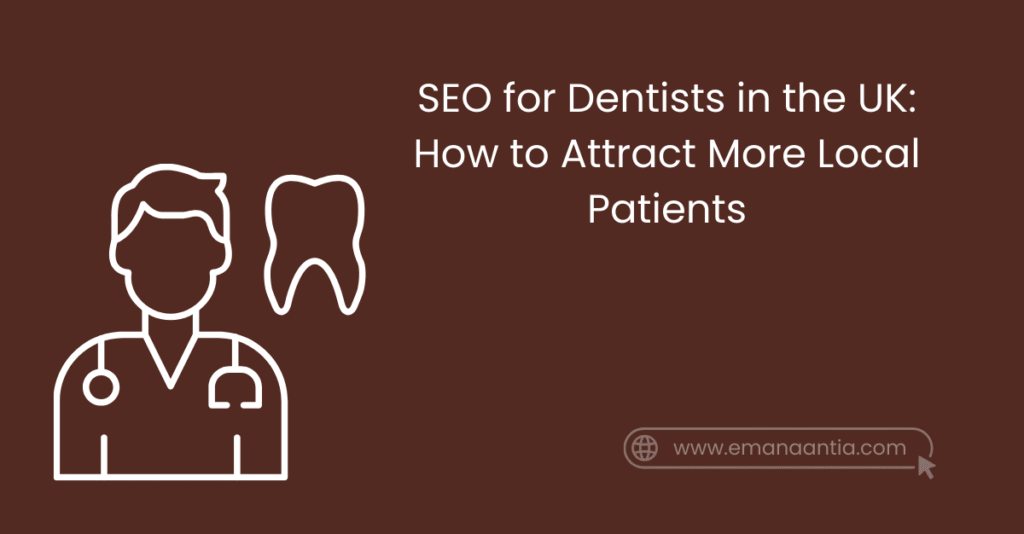Dentistry in the UK is more competitive than ever. With NHS waiting lists growing and private dental practices trying to stand out, having a strong online presence is no longer optional. If your practice isn’t visible when patients search “dentist near me” or “private dentist in London”, you’re missing out on a steady flow of new patients.
That’s where SEO for dentists in the UK comes in. By optimising your website and online profiles, you can improve visibility, attract more local patients, and grow your practice sustainably—without relying solely on costly ads.
This guide explains how dental practices can use SEO to stay ahead of competitors, with practical, proven strategies that deliver results.
Why SEO is Essential for Dentists in the UK
- Patient behaviour is digital: Around 77% of patients search online before booking a healthcare appointment.
- Local intent dominates: Searches like “dentist near me” or “emergency dentist London” are among the most common healthcare queries in the UK.
- Competition is fierce: With NHS backlogs, private practices are booming, and patients now compare clinics online before deciding.
In short: SEO isn’t just about clicks—it’s about being the first choice when patients are ready to book.
Step 1: Local SEO for Dentists
Local SEO is the foundation of dental marketing. It ensures your practice shows up in the Google Map Pack and for “near me” searches.
How to Optimise Local SEO for Dentists:
- Google Business Profile (GBP): Claim and optimise your profile with accurate name, address, phone (NAP), opening hours, and services.
- Local Keywords: Use phrases like “dentist in Manchester” or “cosmetic dentist London” on service pages.
- Citations: Get listed in UK directories like Doctify, WhatClinic, TopDoctors, and Bupa Finder.
- Patient Reviews: Encourage happy patients to leave reviews on Google and respond professionally.
- Location Pages: If you have multiple practices, create separate SEO-optimised landing pages for each location.
Pro Tip: Adding dental services (like teeth whitening, braces, dental implants) into your GBP increases ranking for treatment-specific searches.
Step 2: On-Page SEO for Dental Websites
On-page SEO ensures your website communicates effectively with Google and patients.
Key Optimisations:
- Title Tags & Meta Descriptions: Include location and service. E.g., “Private Dentist in Aberdeen | Cosmetic & Family Dentistry”.
- Service Pages: Instead of one “services” page, create individual pages for treatments like Invisalign, Root Canal, Teeth Whitening.
- Internal Linking: Link treatment pages back to your main “Dentist in [City]” page.
- Image SEO: Use descriptive alt text (“cosmetic dentist London teeth whitening”).
- Mobile Optimisation: With over 60% of searches on mobile, ensure your site is fast and responsive.
Step 3: Content Marketing for Dentists
Patients want answers before they book. Creating educational blog content builds trust and captures search traffic.
Blog Ideas for Dentists:
- “How Much Do Dental Implants Cost in the UK?”
- “Private Dentist vs NHS Dentist: What’s the Difference?”
- “How to Choose the Best Cosmetic Dentist in London”
- “Do I Need Braces or Invisalign? Pros and Cons Explained”
Each blog can target long-tail keywords while linking to your treatment pages.
Pro Tip: Use FAQs with schema markup—this can win you “People Also Ask” spots in Google.
Step 4: Technical SEO
Even the best content won’t rank if your site isn’t technically sound.
- Site Speed: Use tools like Google PageSpeed Insights.
- SSL Certificate: Secure websites (HTTPS) are mandatory for healthcare trust.
- Schema Markup: Add Dentist or MedicalBusiness schema.
- XML Sitemap: Submit via Google Search Console.
- 404 & Redirects: Ensure no broken links.
Step 5: Backlinks & Authority Building
Backlinks (links from other sites) are crucial for SEO.
How Dentists Can Build Backlinks:
- Partner with local businesses (gyms, wellness centres) for referral links.
- Guest posts on health and wellness blogs.
- Get featured in local press for community events (charity drives, free check-ups).
- Submit to dental associations and directories.
Pro Tip: Sponsoring local events or sports clubs often comes with a backlink opportunity.
Step 6: Tracking Success
To know what’s working, track metrics:
- Keyword rankings (Rank Math integrates with Google Search Console).
- GBP insights (calls, bookings, direction requests).
- Website analytics (bounce rate, time on page).
- Conversion rate (online booking form submissions).
Common SEO Mistakes Dentists Make
- Using only one generic “dentist” page instead of treatment-specific content.
- Neglecting reviews or not responding to negative ones.
- Having inconsistent clinic names/addresses across directories.
- Stuffing keywords unnaturally.
- Relying only on paid ads without building organic traffic.
Quick Wins You Can Implement Today
- Claim and optimise your Google Business Profile.
- Create a dedicated page for your most profitable treatment (e.g., Dental Implants London).
- Add a call-to-action on every page (“Book Online Today”).
- Start asking satisfied patients for Google reviews.
- Publish a blog answering a common patient question.
For UK dentists, SEO is the most sustainable way to attract more patients online. By focusing on local SEO, on-page optimisation, reviews, and content marketing, dental practices can rise above competitors and build long-term visibility.
Patients are searching right now for treatments you offer—make sure it’s your practice they find.
